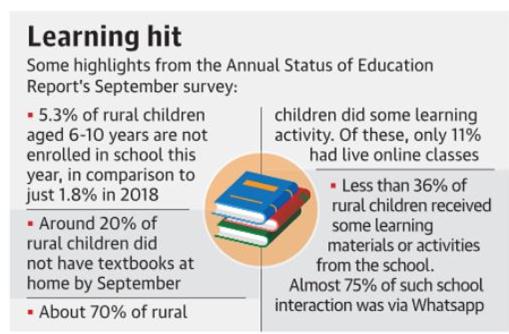The survey highlights the levels of learning loss that students in rural India are suffering due to impact of Covid-19 and varying levels of access to technology, school and family resources, resulting in a digital divide in education.

- ASER is a nationwide survey of rural education and learning outcomes in terms of reading and arithmetic skills.
- Conducted by the NGO Prathamfor the last 15 years.
- This year, the survey was conducted via phone calls.
- According to the survey, about 20% of rural children have no textbooks at home.
- In Andhra Pradesh, less than 35% of children had textbooks.
- More than 98% had textbooks in West Bengal, Nagaland and Assam.
- In the week of the survey, about one in three rural children had done no learning activity at all.
- About two in three had no learning material or activity given by their school that week,and only one in 10 had access to live online classes.
- 3% of rural children aged 6-10 years had not yet enrolled in school this year, in comparison to just 1.8% in 2018.
- Enrolment patterns also show a slight shift toward government schools,with private schools seeing a drop in enrolment in all age groups.